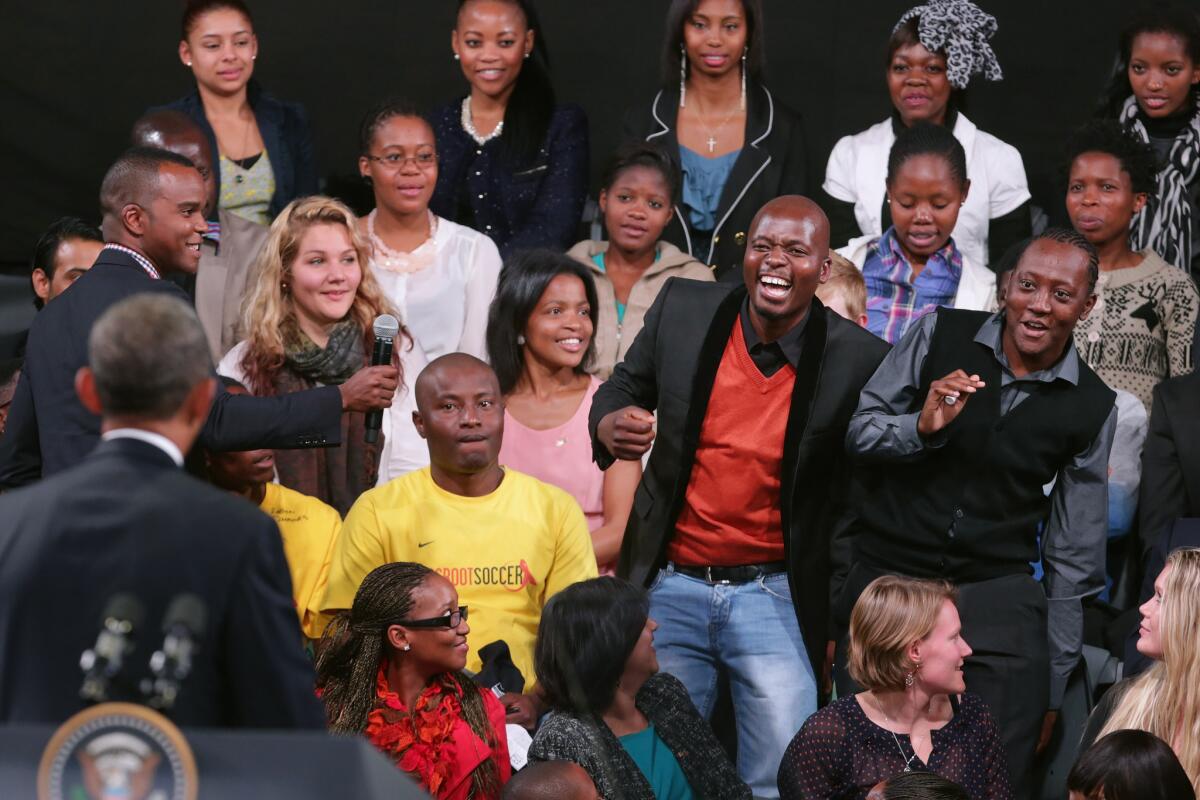Obama’s Soweto town hall: inside and out

- Share via
JOHANNESBURG, South Africa -- The big convoy slowed down on a Soweto corner, and for just a second, President Obama, waving, was framed in the window of his bullet-proof limousine. The crowd surged forward, a cheer rang out. And that was Obama’s Africa tour for the Soweto youth who were on the outside of the president’s town hall-style meeting at the University of Johannesburg campus in Soweto on Saturday.
Their stories of struggle, deprivation and broken families were doubtless harsher than those of the students inside.
Some 600 young people were inside around a square stage within feet of the president. As they awaited his arrival, those in the boisterous crowed clapped and swayed, singing apartheid-era songs. “Mandela, there is no one like you!” they sang in Zulu. Then “Obama is coming!”
Once Obama arrived, those in attenance and others hooked up via video link from other African countries asked pointed questions about foreign aid and the prospects or major trade legislation.
After the meeting, First Lady Michelle Obama tweeted, “These young people are amazing! With their commitment to education, I know they’ll change the world.”
But for many of the young people outside Saturday’s meeting -- jobless or denied access to university -- changing the world is a dream way out of reach. For them, life is about getting by, just clinging on to hope.
Lehlohonole Mathata, 19, a high school graduate who did not get accepted to study at the university where Obama was speaking, said he had given up hope of receiving an education that would lead to his dream job of becoming a graphic designer. Or any job, for that matter.
“I want to study. I want to do graphic design. I don’t know what to do. I thought something would come up, out there. I lost hope,” he said. “I gave up.”
His parents, both jobless, survive on $60 a month paid by the government in child support grants for him and his twin sister. They are not paid for a third sister because she is over 20.
Mathata stood in a black jacket and black jeans, staring, transfixed at the place Obama had just passed.
“I don’t have any hope, but seeing Barack Obama has given me hope, now.”
He said if he had been inside the meeting where Obama was taking questions from young South Africans, “I’d ask him what inspired him to be what he is.”
Tsepo Mahlambi, 22, a skinny young man in a shabby track suit, walked to the Soweto campus of the University of Johannesburg to see Obama on Saturday afternoon, but arrived just after the president had passed.
“Eish!” he said, a typical township expression conveying disappointment, frustration or sadness.
“I came here to see Obama. I wanted to see the American president. I missed him by maybe a minute. I feel unhappy.”
He imagined that if he had been lucky enough to see him, “I could feel in my blood that I’m alive.”
Many South Africans have English names as well as African ones and Mahlambi’s is Happy. But his life story is anything but.
He is a head of of an orphan family, the only male, with six sisters to support. His mother is alive but seriously ill, and the children do not live with her. Homeless for a while, they live in a shack. He never knew his father.
“My father was killed by another man. I was a little baby,” he said, holding his hand palm down about a foot from the ground to demonstrate his height at the time. “They told me that he was stabbed.”
He dropped out of school at 16 because he was homeless. His last job, two years ago, was temporary, just cutting grass and picking up litter.
He earns about $20 a month collecting scrap metal to sell to dealers. You have to be quick, he says, to beat all the other people scavenging the urban landscape for any loose metal that can be picked up and dragged away.
“I’m working with scrap. I pick up tins and metal so I can get money.”
But not all the young Sowetans drawn to see Obama pass were struggling. Mpumelelo Nbaba, 16, from a middle-class family, commutes every day to a school in a suburb further north, regarded as offering a better level of facilities and education than Soweto schools, because it used to be an all-white school under apartheid.
Her ambition: to be a stockbroker. She bubbled confidently about working one day on Wall Street.
Like many of the young Sowetans, she was inspired by Obama’s visit.
“I’m very happy to see him because he’s the president and he’s in Soweto, where I grew up. I think it’s really exciting, especially since he’s in the university where I plan to come to.”
ALSO:
Vatican cleric, two others arrested for alleged corruption
Edward Snowden: Not the first to be caught in airport limbo
Incoming Iranian president vows to pursue moderate course
More to Read
Sign up for Essential California
The most important California stories and recommendations in your inbox every morning.
You may occasionally receive promotional content from the Los Angeles Times.














